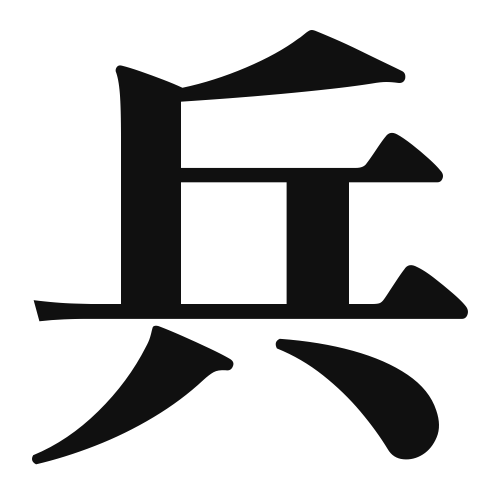1. Overview of Meaning
The kanji “兵” (pronounced “hei” or “bō”) primarily means “soldier” or “military.” It is often associated with concepts of warfare and combat.
2. Formation and Radical
Formation of the Kanji: The kanji “兵” is classified as a phonetic-ideographic character (形声文字). It combines a phonetic component with a meaning component, representing both sound and meaning.
Radical: The radical for “兵” is “人” (meaning “person”), which indicates its connection to human activities, particularly in a military context.
3. Examples of Usage
Common Words and Phrases: Some frequently used words that include “兵” are:
- 兵士 (へいし, heishi) – soldier
- 兵器 (へいき, heiki) – weapon
- 軍兵 (ぐんぺい, gunpei) – military troops
Example Sentences in Daily Conversation:
- 彼は兵士として戦争に行った。 (かれはへいしとしてせんそうにいった。) – He went to war as a soldier.
- 新しい兵器が開発された。 (あたらしいへいきがかいはつされた。) – A new weapon has been developed.
4. Synonyms and Antonyms
Similar Kanji: A similar kanji is “軍” (ぐん, gun), which means “army.” While both refer to military concepts, “兵” specifically denotes individual soldiers, whereas “軍” refers to the collective military force.
Antonyms: An antonym for “兵” could be “民” (みん, min), meaning “civilian,” which represents non-military individuals.
5. Cultural and Historical Background
Connection to Japanese Culture: The concept of “兵” is deeply rooted in Japanese history, particularly during the samurai era when warriors played a crucial role in society.
Proverbs and Idioms: One common saying is “兵は詭道なり” (へいはきどうなり), which translates to “All warfare is based on deception,” highlighting the strategic aspects of military engagements.
